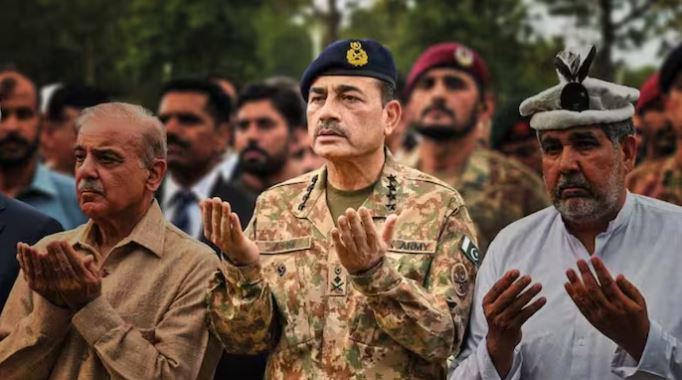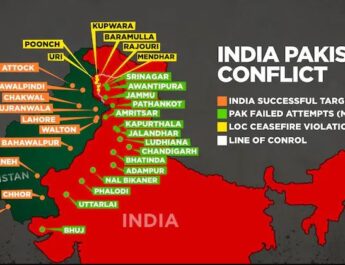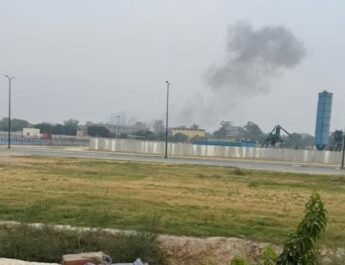General Asim Munir, the chief of the Pakistan army,
General Asim Munir, the chief of the Pakistan army, is not merely at the center of the turmoil affecting the subcontinent; he embodies the turmoil itself. His previous role as the head of the infamous Inter-Services Intelligence (ISI) during the planning of the brutal Pulwama terror attack, which resulted in the deaths of 40 Central Reserve Police Force personnel on February 14, 2019, is not a mere coincidence. Now, six years later, Munir, who has risen to become the de facto leader of Pakistan, finds himself once again in India’s sights as the purported architect of the Pahalgam terror attack that claimed the lives of 25 tourists and one local resident in the picturesque region of Kashmir on April 22.
As the Modi administration prepares a military response to the most devastating civilian massacre in the Valley in two decades, it is crucial that they do not underestimate the cunning of Asim Munir. Those who have previously misjudged him have faced severe consequences. Imran Khan, for instance, who was the Prime Minister of Pakistan, appointed Munir as ISI chief in 2018, only to dismiss him nine months later, reportedly due to Munir’s willingness to inform him about the alleged corrupt activities of his wife, Bushra Bibi.
Munir has not forgotten the indignity of being possibly the shortest-serving ISI chief and patiently awaited his chance for retribution. This opportunity arose after Imran was ousted in an army-orchestrated ‘parliamentary coup’ in April 2022, leading to Munir’s ascension to army chief in November, supported by a coalition opposed to Imran. Subsequently, Munir orchestrated Imran’s imprisonment on various corruption charges, resulting in a 14-year sentence for the former Prime Minister earlier this year.
Analyzing Munir’s personality traits, psychological composition, strengths, and weaknesses has become pivotal to India’s approach in formulating an appropriate response to Pakistan for the violence it incited in Pahalgam. Munir leads a formidable army of half a million personnel, making it the sixth largest globally, equipped with nuclear capabilities and evenly matched against Indian forces along the Line of Control.
As a leading expert, who prefers to remain anonymous, states, ‘This is not an asymmetric conflict like that of Israel and Hamas or Azerbaijan and Armenia. This involves two highly professional armies that are equally equipped and possess nuclear arms. Any action we take should be met with his retaliation. Managing the escalation of conflict will prove challenging.
Given Munir’s recent conduct, we must brace ourselves for unpredictability and potential surprises, including the possibility of him instigating an incident and attributing blame to us.’ With Munir being one of the few Pakistani generals to have served as both the head of ISI and the Director General of Military Intelligence, it is anticipated that he has meticulously devised his strategy.
This was clearly demonstrated by Pakistan’s immediate suspension of the 1972 Simla agreement following India’s decision to pause the Indus Waters Treaty (IWT). Another strategist, well-versed in war gaming, observes, ‘Munir would have preemptively analyzed all scenarios and is proceeding with heightened caution. We must assess him carefully, as he possesses significant intelligence and operational experience. It resembles a chess match where we need to anticipate his moves ten steps ahead while formulating our own contingency plans. Therefore, we must continuously second-guess his strategies until we arrive at some provisional conclusions. Experts should also conduct a thorough psychological assessment based on his actions and statements.
Munir’s 17-month leadership has revealed significant insights into his capacity for strategic risk-taking
Munir’s 17-month leadership has revealed significant insights into his capacity for strategic risk-taking. Initially, he faced challenges due to unprecedented internal dissent following Imran’s arrest. However, Munir effectively strengthened his control over the military, removing corps commanders who opposed him and replacing them with loyal supporters. He has since evolved from merely being Pakistan’s security chief to wielding comprehensive political power, including addressing the nation’s struggling economy through the army-led Special Investment Facilitation Council.
Furthermore, he has skillfully ‘cleansed’ the Supreme Court of Imran supporters by facilitating an amendment in Parliament that permits the supersession of judges. In a remarkable move, he also secured another amendment that extended his tenure from three to five years, ensuring his leadership until 2027, with the possibility of further extensions without age restrictions.
Michael Kugelman, a South Asian analyst in the US, notes, ‘Munir’s management of the polycrisis he faced upon becoming chief is quite revealing. He has effectively tackled severe political instability, an economy on the brink of collapse, a resurgence of terrorism, and notable internal dissent within the army. While he has encountered failures, his decisive actions demonstrate a remarkable confidence in his involvement across various public policy areas.’ Despite his consolidation of power, Munir has faced tangible setbacks in security, particularly highlighted by the recent hijacking of the Jaffar Express by Baloch rebels, which has undermined both his and the army’s credibility. Additionally, there is a rising dissatisfaction among Pakistan’s youth regarding the governance of the country.
The military of Pakistan has historically held a significant influence over the governance of the nation; throughout its 77-year history, the country has experienced martial law for a total of 33 years across three distinct periods. Recently, General Munir has risen to prominence as one of the most formidable army chiefs without resorting to the overthrow of the civilian government.
He is the first army chief since General Zia-ul-Haq to embrace Islamist nationalism, wearing it as a symbol of pride. Notably, he is distinguished as a Hafiz-e-Quran, having memorized the Quran entirely, a feat he accomplished while serving as the army’s attaché in Saudi Arabia. This characteristic was inherited from his father, Syed Sarwar, who emigrated from Jalandhar following the Partition. Sarwar, a schoolteacher in Rawalpindi, also led the Friday prayers at a local mosque.
Munir’s education began in a madrassa located in the garrison town, and he later secured a commission in the army through the Officers Training School (OTS) rather than the more esteemed Pakistan Military Academy. Nevertheless, this did not hinder his rapid, albeit tumultuous, ascent to the upper echelons of the military.
Rana Banerjee, a former special secretary of the Research and Analysis Wing (RAW), India’s external intelligence agency, and a specialist on Pakistan, remarks, ‘Munir’s first name, Asim, translates to the great savior, and the army chief appears to be motivated by a profound sense of religious devotion and purpose. He is thorough, particularly in holding his adversaries accountable, yet lacks visionary qualities and seems constrained in his thought processes. Recently, he has adopted a provocatively disparaging tone towards India.’
A STUDY IN CONTRASTS
This stands in stark contrast to his mentor and immediate predecessor, General Qamar Javed Bajwa, who served as army chief from 2016 to 2022. Bajwa played a significant behind-the-scenes role in Pakistani politics during the tenure of the unpredictable Imran Khan as Prime Minister, reinforcing the military’s influence over public policy. It was during his leadership that the Pulwama attacks were sanctioned, prompting India to conduct air strikes on terrorist camps within Pakistani borders. This marked India’s first air assault since the 1971 war, establishing a new standard of deterrence and conveying to Pakistan that cross-border terrorism would face consequences.
Towards the conclusion of his term, Bajwa advocated for a significant pivot in Pakistan’s priorities from geopolitics to geoeconomics, emphasizing the need for the nation to stabilize its economy through regional connectivity and trade partnerships, even with India. Demonstrating his commitment, he initiated a ceasefire agreement along the Line of Control in February 2021, which lasted for four years until Munir orchestrated the Pahalgam massacre, effectively ending the fragile peace. As Ajay Bisaria, a former Indian High Commissioner to Pakistan, notes, ‘Bajwa was fundamentally different in his approach; he recognized that the jihadi framework established by the army was no longer beneficial for Pakistan and sought to redirect focus towards economic growth. He desired reform but favored a gradual approach. Meanwhile, his relationship with Imran deteriorated, leading to a loss of resolve.’
In contrast to the Bajwa doctrine, Munir envisions Pakistan as a ‘hard state’—one that is resilient and uncompromising in the face of both internal and external challenges, always prepared for a decisive military response. Internally, as Banerjee points out, Munir has ruthlessly suppressed dissent within the army and the broader political landscape.
Outwardly, he presented a stern and uncompromising demeanor, particularly towards the Taliban regime in Afghanistan, which continued to provide support and resources to the Tehrik-e-Taliban Pakistan (TTP), a militant group advocating for an Islamic emirate in Pakistan. In late 2023, Munir took the drastic step of expelling over 150,000 Afghan refugees from Pakistan, placing him in direct opposition to the Taliban leadership in Afghanistan. Furthermore, while he maintained a practical relationship with Iran, Munir did not hesitate to launch a missile into Iranian territory in response to Tehran’s drone attack on an Iranian resistance faction based in Pakistan.
He has also implemented a stringent crackdown on Baloch rebel factions seeking an independent Balochistan. However, these groups have managed to regroup and recently retaliated fiercely, challenging the Pakistani army’s aggressive strategy. Munir has consistently accused India of inciting and supporting both the Baloch and TTP insurgents, a claim many experts in Pakistan cite as justification for the Pahalgam attack. For India, these developments clearly indicate that Munir is a relentless adversary, unafraid to respond even when the odds appear to be against him.
THE JIHADI TURN
India faces additional concerns. Since Munir assumed the role of army chief, he has adopted a more aggressive stance on religious nationalism. He has redefined the army’s mission not only as the protector of Pakistan’s territorial integrity and sovereignty but also as the custodian of its ideological boundaries.
In August 2023, while addressing a tribal jirga in Peshawar, Munir proclaimed, ‘No power in the world can harm Pakistan. We are engaged in jihad (holy war) in the name of Allah, and victory will be ours. The primary goal of the Pakistan army is to be shahid (martyr) or ghazi (one who participates in jihad).’
This declaration earned him the nickname ‘Jihadi General.’ What alarmed Indian analysts, however, were Munir’s remarks at an Overseas Pakistanis Convention on April 16, just six days prior to the Pahalgam incident, where he crudely reiterated the two-nation theory, emphasizing the ‘sharp distinction between Hindus and Muslims’ in a manner more extreme than even Zia’s rhetoric.
As T.C.A. Raghavan, a former Indian High Commissioner to Pakistan, notes, ‘Munir’s ideological stance on India adheres to the traditional two-nation theory, and he perceives the Pakistan army as the barrier preventing the nation from being completely dominated by India. He views Kashmir as the unresolved issue stemming from the creation of Pakistan and believes that Pakistan is a victim of significant injustice, with the responsibility to rectify this resting on the Pakistan army.’
Analysts suggest that multiple factors may have influenced Munir’s decision to authorize the Pahalgam attacks, including domestic unrest and the inability to manage internal conflicts and uprisings that have tarnished the army’s reputation. In response to this pressure, Munir invoked India to unite the public in support of his leadership.
The Pakistani general may have already achieved his goal, particularly following India’s decision to suspend the IWT, a move that poses a risk to the water supply for the populous and politically significant provinces of Punjab and Sindh. According to Bisaria, “Munir aims to strengthen his authority and position himself as the Supreme Leader.” He adds, “With the liberal and urban factions turning against him, he seeks to gain the support of the majority of the right-wing establishment.”
A Pakistani analyst, who prefers to remain anonymous, concurs, stating, “There are two distinct Pakistans. One is Jihadi Pakistan, focused on fostering a national identity rooted in deep-seated hostility towards India. The other is non-Jihadi Pakistan, which aspires to function as a federation and maintain normal relations with Afghanistan, Iran, India, and China for trade purposes.
Munir is appealing to the Jihadi Pakistan, which constitutes about 60 percent of the population. Therefore, India must engage the non-Jihadi demographic.” Strategists suggest another motivation for Munir’s actions—the belief that India is gaining the upper hand in Kashmir. With the abrogation of Article 370, an elected government established, and tourists returning to the Valley, there is concern that the situation in Kashmir could irreversibly tilt in favor of New Delhi.
Consequently, a Mumbai 2008-style attack on civilians has become necessary to shatter the facade of peace and stability in the Valley. Experts also interpret the Pahalgam attacks as part of a coordinated strategy by the ISI to initiate what is referred to as the K2 operation—deploying both Kashmir and Khalistan terrorists to destabilize the two border states. The terrorists in Kashmir are well-trained and armed with advanced weaponry, utilizing sophisticated communication technology, possibly of Chinese origin, which India has struggled to intercept and decode.
DRUMMING UP INTERNATIONAL SUPPORT
Kugelman highlights Munir’s efforts to garner international backing for his jihad against India. When Donald Trump assumed the presidency, he sought to strengthen ties by facilitating the arrest and deportation of ISIS-K commander Mohammad Sharifullah from Pakistan to the US. Sharifullah was responsible for the deadly Abbey Gate bombing that resulted in the deaths of 13 US service members during the Afghanistan evacuation. Trump expressed gratitude to Pakistan for its assistance.
Notably, just a week prior to the public announcement of the arrest, the US had transferred $397 million to Pakistan for the upkeep of its F-16 aircraft. Following the Pahalgam incident, Trump condemned the terrorist attack but refrained from blaming Pakistan, asserting that the conflict with India has persisted for millennia and should be resolved bilaterally. Meanwhile, China and Turkey have aligned with Pakistan’s call for an independent investigation into the attack.
Over the last two years, Pakistan has been acquiring advanced military technology from both nations, alongside sophisticated electronic warfare systems from China. Despite facing financial difficulties, Munir initiated a modernization program for the army, which appears to have bolstered his confidence in confronting India. However, Munir may have miscalculated with his latest provocation. The targeting of tourists in Pahalgam has jeopardized Pakistan’s standing in Kashmir, as the Valley has united in protest against the attacks for the first time, adversely affecting the tourism sector that had been thriving for the past two years and impacting local livelihoods.
Experts in Pakistan express concern over Munir’s actions, arguing that a military confrontation with India is the last thing the country can afford, especially given its ongoing economic struggles. They suggest that Munir’s background in the ISI has led to reckless decision-making, noting that it is uncommon for someone from the spy agency to ascend to the position of chief.




